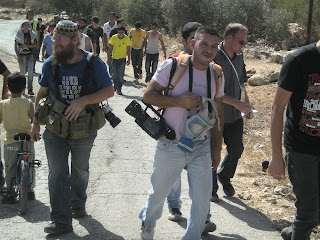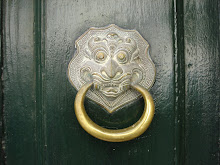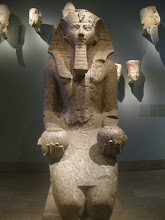I've been collecting a whole mental list of items I need to blog about, but what with work and family I haven't had the time nor the energy to actually sit down and write.
But now, I'm taking the time. Here follows a summary of some of the things that have been going on:
We started recording a TV series at work. It's a development project for youth which we received funding for from a foreign aid organization.
The project is aimed at giving an opportunity to young women and men in Palestine to express themselves freely regarding problems and matters that really mean something, while at the same time allowing them to take an active part in the public sphere and thereby sort of creating a space for democratic participation.
I had a vision of it being an honest, sometimes controversial, talk show that would stir up a society-wide debate on everything from unemployment to how the occupation affects love affairs between Palestinians in the occupied territories and inside what is now Israel. We would discuss the peace negotiations, gender roles, relations between Christian and Muslim Palestinians...
But with all donor-related rules and regulations, we have been obliged to water it down to a wimpy little Q and A program that is half-advertisement for the donor's other programs. We are not allowed to discuss political or religious topics at all, and what's worse, they ask us to literally edit out mentions of the Israeli occupation if somebody happens to bring it up of his or her own accord.
(Perspective: something like a third of Palestine's economy is directly made up of foreign aid - so you can begin to imagine what this implies for basic human rights such as freedom of speech and freedom of the press, not to mention the development of a democratic society in the occupied Palestinian territories).
I will not mention our donor by name in case they google themselves, but suffice it to say that the money comes from a certain uncle by the name of Sam.
Anyhow, it is not only this censored TV show that has been taking up most of my time lately, my boyfriend's mom also came down with a severe case of double pneumonia a few weeks ago and had to go to hospital.
It is obviously distressing for any family anywhere in the world when a family member becomes hospitalized for whatever reason, but I daresay that being a Palestinian family in the occupied territories adds another layer of worry. I'll tell you why:
It all started like flu-like symptoms after Tarek's mom came back from a business trip to Turkey, but we quickly realized it was much more serious than that and took her to a hospital in Ramallah on a Sunday. On Monday she started feeling worse, on Tuesday even more so, and by Wednesday she had been moved to the intensive care unit by a group of perplexed doctors and nurses who didn't understand why she wasn't get any better.
The standard of the hospitals here leave much to wish for - after all we're living under occupation, in a conflict zone - so at this point, we realized that we needed to take her to a hospital in Israel.
However, because we live under occupation we can't just go. Even if a person is dying, they can't go without a special permit issued by the Israeli occupation authorities. And this might take three days, or a week, or who knows how long.
Who knows how many people die before they can get proper care?
Luckily, my boyfriend's family know people who know people, so in the end it only took one full day of office visits and paper signing before we got the OK to take Tarek's mom to a hospital in West Jerusalem.
Then it turned out that there were no beds available until the day after. So Tarek's mom had to stay one more night in intensive care in Ramallah before she could go see another doctor in Jerusalem.
At the same time, Tarek and his father were doing all the necessary paperwork to hopefully get permits to go with Tarek's mom to Jerusalem.
Finally, on Thursday at midday, they were allowed to go with her in the ambulance to Shaare Zedek Medical Center in West Jerusalem, where she stayed for another 5 days. The first night she was kept in the intensive care unit because she was close to lung collapse, and her doctor said that she had come to Jerusalem in the last minute.
Again, imagine those who don't get permits. And those who can't pay the hospital bill.
I could go and visit her every day, which I did, but Tarek and his dad did not get permits after the first day because they were suddenly considered a "security risk." (Who knows why?)
So Tarek's dad slept in the hospital for four days (even though that meant that he risked being arrested, fined and jailed since he was a Palestinian in Israel without a permit). After two days Tarek was cleared, apparently ceased being a security risk, and could go and visit his mom.
The arbitrariness of occupation policies.
Tarek's mom is doing much better and things are getting back to normal. Except our TV program is still being censored.

But now, I'm taking the time. Here follows a summary of some of the things that have been going on:
We started recording a TV series at work. It's a development project for youth which we received funding for from a foreign aid organization.
The project is aimed at giving an opportunity to young women and men in Palestine to express themselves freely regarding problems and matters that really mean something, while at the same time allowing them to take an active part in the public sphere and thereby sort of creating a space for democratic participation.
I had a vision of it being an honest, sometimes controversial, talk show that would stir up a society-wide debate on everything from unemployment to how the occupation affects love affairs between Palestinians in the occupied territories and inside what is now Israel. We would discuss the peace negotiations, gender roles, relations between Christian and Muslim Palestinians...
But with all donor-related rules and regulations, we have been obliged to water it down to a wimpy little Q and A program that is half-advertisement for the donor's other programs. We are not allowed to discuss political or religious topics at all, and what's worse, they ask us to literally edit out mentions of the Israeli occupation if somebody happens to bring it up of his or her own accord.
(Perspective: something like a third of Palestine's economy is directly made up of foreign aid - so you can begin to imagine what this implies for basic human rights such as freedom of speech and freedom of the press, not to mention the development of a democratic society in the occupied Palestinian territories).
I will not mention our donor by name in case they google themselves, but suffice it to say that the money comes from a certain uncle by the name of Sam.
Anyhow, it is not only this censored TV show that has been taking up most of my time lately, my boyfriend's mom also came down with a severe case of double pneumonia a few weeks ago and had to go to hospital.
It is obviously distressing for any family anywhere in the world when a family member becomes hospitalized for whatever reason, but I daresay that being a Palestinian family in the occupied territories adds another layer of worry. I'll tell you why:
It all started like flu-like symptoms after Tarek's mom came back from a business trip to Turkey, but we quickly realized it was much more serious than that and took her to a hospital in Ramallah on a Sunday. On Monday she started feeling worse, on Tuesday even more so, and by Wednesday she had been moved to the intensive care unit by a group of perplexed doctors and nurses who didn't understand why she wasn't get any better.
The standard of the hospitals here leave much to wish for - after all we're living under occupation, in a conflict zone - so at this point, we realized that we needed to take her to a hospital in Israel.
However, because we live under occupation we can't just go. Even if a person is dying, they can't go without a special permit issued by the Israeli occupation authorities. And this might take three days, or a week, or who knows how long.
Who knows how many people die before they can get proper care?
Luckily, my boyfriend's family know people who know people, so in the end it only took one full day of office visits and paper signing before we got the OK to take Tarek's mom to a hospital in West Jerusalem.
Then it turned out that there were no beds available until the day after. So Tarek's mom had to stay one more night in intensive care in Ramallah before she could go see another doctor in Jerusalem.
At the same time, Tarek and his father were doing all the necessary paperwork to hopefully get permits to go with Tarek's mom to Jerusalem.
Finally, on Thursday at midday, they were allowed to go with her in the ambulance to Shaare Zedek Medical Center in West Jerusalem, where she stayed for another 5 days. The first night she was kept in the intensive care unit because she was close to lung collapse, and her doctor said that she had come to Jerusalem in the last minute.
Again, imagine those who don't get permits. And those who can't pay the hospital bill.
I could go and visit her every day, which I did, but Tarek and his dad did not get permits after the first day because they were suddenly considered a "security risk." (Who knows why?)
So Tarek's dad slept in the hospital for four days (even though that meant that he risked being arrested, fined and jailed since he was a Palestinian in Israel without a permit). After two days Tarek was cleared, apparently ceased being a security risk, and could go and visit his mom.
The arbitrariness of occupation policies.
Tarek's mom is doing much better and things are getting back to normal. Except our TV program is still being censored.

























